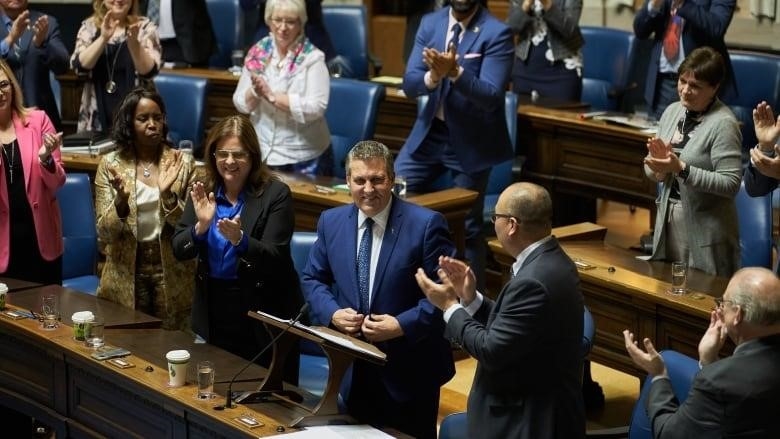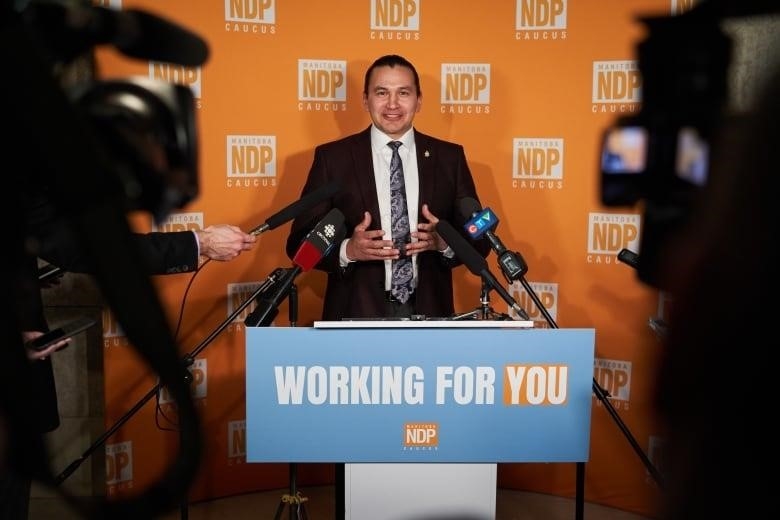
The basic personal exemption amount goes from just over $10,000 to $15,000. This means that the average Manitoban will save $448
All working Manitobans will have less of their income taxed, and thousands of the province’s lowest-income earners will stop paying income tax altogether as the Progressive Conservative government continues to loosen the purse strings in the last few months before an election in October.
The Manitoba government’s 2023 budget, which was released on Tuesday, says that the level of income at which people start paying taxes will go up from $10,145 to $15,000.
This amount, called the basic personal exemption, usually goes up every year based on the rate of inflation. This year, based on that calculation, the exemption would have been $10,855.
The province says that because of the bigger increase, a taxpayer will save an average of $448. The change also means that 47,000 more people with low incomes will not have to pay any income tax at all, according to the province.
The government also wants to raise all tax brackets starting in 2024. This will make working Manitobans’ tax burdens even lighter.
Finance Minister Cliff Cullen said that the budget was a big change from how the Progressive Conservatives usually do things.
The government plans to have a $363 million deficit, but it could have balanced its budget with the money it is spending on tax cuts instead.
“Unlike the budgets of my predecessors, where fiscal responsibility was king, Budget 2023 fully reflects the roots of our premier, who is a Progressive Conservative,” Cullen said in his speech presenting the budget to the legislature on Tuesday afternoon.
Premier Heather Stefanson said at a briefing in the early afternoon that her government’s budget “puts hundreds of millions of dollars back in the pockets of Manitobans while investing billions more in the services families rely on.”
“It really is a historic help for everyone in Manitoba.”
The $22 billion provincial budget is almost $2 billion more than the previous budget.All 19 government departments will get more money, and health care spending will go up by almost $500 million.
In particular, spending on health care has gone up by 7%, from $6.7 billion last year to $7.1 billion for the year ending on March 31, 2024.
Philippe Cyrenne, an economics professor at the University of Winnipeg, said that the Progressive Conservatives’ budget is a way for them to win over voters.
“In some ways, it looks like a budget for an election,” he said. “Tax relief seems to be aimed at people who worry about how competitive it is to live and work in Manitoba.”
He said that the province’s competitiveness will likely become a bigger problem as places across the country look to other places to fill labor shortages.
Changing approach for Torie
Cullen told reporters during the afternoon briefing that the Tories are not giving up the fiscal responsibility that has been their trademark. However, he did say that his government is moving away from a strict focus on the province’s bottom line.
“Contrary to what you may have heard, we are not cutting budgets—we are increasing them,” he said.
The province is making use of money that came in unexpectedly. Compared to last year, federal transfers have gone up by $1.05 billion, income tax revenues by $574 million, and provincial sales taxes by $192 million.
With the changes to tax brackets that were promised for 2024, the lowest tax rate of 10.8%, which currently applies to the first $36,842 of taxable income, will apply to the first $47,000 of taxable income starting next year.
By 2024, the highest tax rate of 17.4% will apply to taxable incomes of $100,000, up from $79,625 today.
Cullen said that raising the basic personal exemption and changing the tax brackets were “by far” the most important suggestions from a working group that the province set up last year to make Manitoba’s tax burden more like that of other provinces.
The government is also keeping its promise to keep getting rid of education property taxes over time. The rebate for residential and farm properties will go from 37.5% to 50%. This means that the average homeowner will save $774.
Also, starting next year, payroll taxes will be cut for about 900 businesses.
The NDP tries to “change the channel.
The Canadian Taxpayers Federation’s Prairie Director, Gage Haubrich, said that the tax cuts are nice, but the province shouldn’t wait until 2024 to start putting some of them into place.
He said that the extra money, which could be hundreds of dollars per person, would be very helpful to Manitobans who are having trouble making ends meet.
Wab Kinew, leader of the opposition NDP, said he wouldn’t promise to keep the same tax policies if his party wins the next election. He also questioned whether the government was serious about keeping its new promises.
Since the PCs beat the NDP and came back to power in 2016, Kinew said, “We all remember the seven years of cuts.”
“Now, in an election year, the PCs want Manitobans to forget about this. The PCs want to change the channel, but I don’t think people in this province trust the PCs anymore.”

He said that the NDP, which has led in polls for the past two years, will reveal its own financial plan closer to the election.
Dougald Lamont, the leader of the Manitoba Liberal Party, called the budget irresponsible. He said that the government is “giving away hundreds and hundreds of millions of dollars in unfunded tax cuts” while still running a deficit.
A union representative, on the other hand, said that the budget missed a chance to put more money into recruiting and keeping employees.
“They’re so far behind, their wages are so far behind, and our members need to catch up and keep up,” said Kyle Ross, president of the Manitoba Government and General Employees’ Union.
Other budget promise
The budget also includes commitments that have already been made to spend $100 million more on education from kindergarten to grade 12, $76 million more on child care, and $47 million more on operating costs for cities and towns.
A government official says that the province is spending $81 million to raise the average hourly wage of workers who help people with disabilities from $15 to $19 per hour. These workers currently make around $15 to $16 per hour.
The government will spend 120 million dollars to help people with diabetes in more ways. With the money, adults with Type 1 and Type 2 diabetes who are eligible will be able to get insulin pumps for longer.
There will be an extra $65 million given to colleges and universities after high school. For the next school year, the province will only allow tuition to go up by 2.75 percent.
The province’s venture capital fund will get an extra $50 million, which was announced in the 2022 budget.This will double the amount of money the fund has.
There are also plans to spend $40 million on infrastructure to help the CenterPort South development grow.
WATCH | Premier fields budget questions from CBC:
